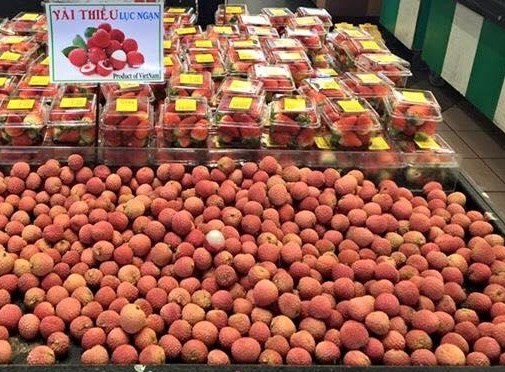03/03/2026, 02:00
Vietnamese firms urged to file for IP protection in foreign markets
Vietnamese firms should attach more importance to registering for intellectual property protection in foreign markets if they wish to develop brands abroad, according to the National Office of Intellectual Property (NOIP).
Luc Ngan lychee of Bac Giang province is protected geographical indication in Japan. Vietnamese firms are urged to pay more attention to register for intellectual property protection in foreign markets. (Photo baochinhphu.vn)
Vietnamese firms should attach more importance to registering for intellectual property protection in foreign markets if they wish to develop brands abroad, according to the National Office of Intellectual Property (NOIP).
NOIP’s statistics show that there were about 50,000 applications for intellectual property protection in the domestic market but only around 280 applications for protection in foreign markets. This reflects that Vietnamese firms are not paying adequate attention to intellectual property protection in the import and export sector.
Pham Ngoc Luan, CEO of Meet More Coffee, said that after exporting several batches of coffee to South Korea, his company proceeded to apply for protection of the Meet More brand. However, the application was rejected for the reason that the brand was already registered in the Korean market.
Luan was surprised to learn that it was his company’s distribution partner who had registered the Meet More brand in the Republic of Korea. Fortunately, his company successfully negotiated with his distribution partner to get the rights to the name.
There are also lessons to learn from past trademark disputes in foreign markets for companies like Trung Nguyen Coffee, Vinataba, Ben Tre coconut candy or Phu Quoc fish sauce.
Most recently an application to trademark ST25 rice was lodged in the US to the ire of the local scientists who developed the new strain of rice.
NOIP’s Deputy Director Tran Le Hong said that Vietnamese firms must pay attention to building and protecting brands if they want to engage with foreign markets.
Hong said that the protection of brands was territorial, meaning that if a trademark was protected in Vietnam, this did not mean that the trademark was also protected in other markets. Businesses needed to consider registering for trademark protection in foreign countries, he stressed.
According to Nguyen Quoc Thinh from Thuong Mai (Commerce) University, there are several reasons that make Vietnamese enterprises hesitant to register for trademark protection in foreign markets.
The first reason is the lack of awareness. Other reasons were that enterprises were discouraged by complicated procedures together with the high cost of registering in some markets that made it difficult for small and medium – sized enterprises.
“It is time Vietnamese enterprises started to seriously consider establishing protection for their brands in foreign markets which is critical to their development,” Thinh said.
According to Hong, enterprises could get support from the NOIP to register brand protection abroad or get consultations from about 200 IP consultancy firms in Vietnam.
Hong said that the registry for trademark protection should be put into consideration together with a detailed business plan for specific markets./.
NOIP’s statistics show that there were about 50,000 applications for intellectual property protection in the domestic market but only around 280 applications for protection in foreign markets. This reflects that Vietnamese firms are not paying adequate attention to intellectual property protection in the import and export sector.
Pham Ngoc Luan, CEO of Meet More Coffee, said that after exporting several batches of coffee to South Korea, his company proceeded to apply for protection of the Meet More brand. However, the application was rejected for the reason that the brand was already registered in the Korean market.
Luan was surprised to learn that it was his company’s distribution partner who had registered the Meet More brand in the Republic of Korea. Fortunately, his company successfully negotiated with his distribution partner to get the rights to the name.
There are also lessons to learn from past trademark disputes in foreign markets for companies like Trung Nguyen Coffee, Vinataba, Ben Tre coconut candy or Phu Quoc fish sauce.
Most recently an application to trademark ST25 rice was lodged in the US to the ire of the local scientists who developed the new strain of rice.
NOIP’s Deputy Director Tran Le Hong said that Vietnamese firms must pay attention to building and protecting brands if they want to engage with foreign markets.
Hong said that the protection of brands was territorial, meaning that if a trademark was protected in Vietnam, this did not mean that the trademark was also protected in other markets. Businesses needed to consider registering for trademark protection in foreign countries, he stressed.
According to Nguyen Quoc Thinh from Thuong Mai (Commerce) University, there are several reasons that make Vietnamese enterprises hesitant to register for trademark protection in foreign markets.
The first reason is the lack of awareness. Other reasons were that enterprises were discouraged by complicated procedures together with the high cost of registering in some markets that made it difficult for small and medium – sized enterprises.
“It is time Vietnamese enterprises started to seriously consider establishing protection for their brands in foreign markets which is critical to their development,” Thinh said.
According to Hong, enterprises could get support from the NOIP to register brand protection abroad or get consultations from about 200 IP consultancy firms in Vietnam.
Hong said that the registry for trademark protection should be put into consideration together with a detailed business plan for specific markets./.
RECOMMENDED TOPICS









